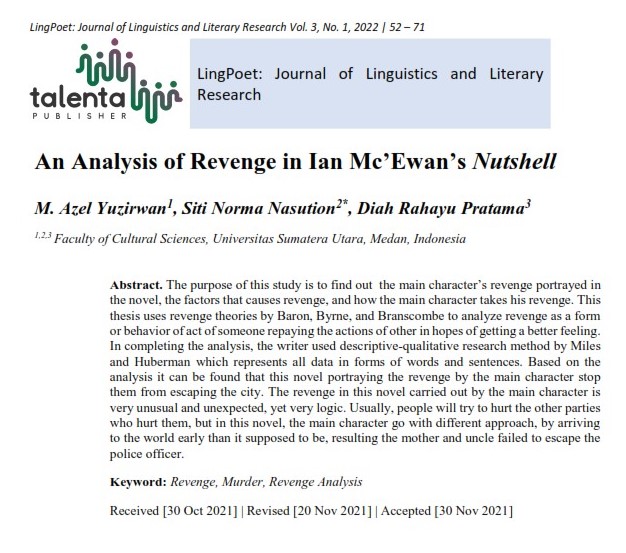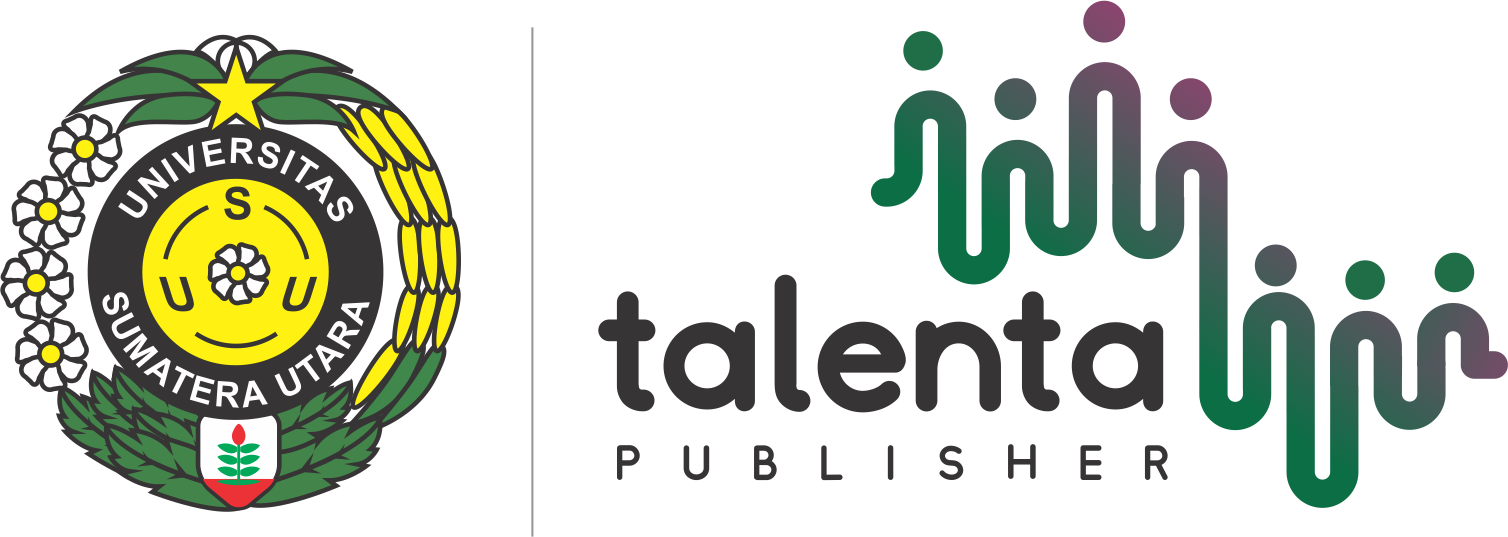An Analysis of Revenge in Ian Mc’Ewan’s Nutshell
DOI:
https://doi.org/10.32734/lingpoet.v3i1.7501Keywords:
Revenge, Murder, Revenge AnalysisAbstract
The purpose of this study is to find out  the main character’s revenge portrayed in the novel, the factors that causes revenge, and how the main character takes his revenge. This thesis uses revenge theories by Baron, Byrne, and Branscombe to analyze revenge as a form or behavior of act of someone repaying the actions of other in hopes of getting a better feeling. In completing the analysis, the writer used descriptive-qualitative research method by Miles and Huberman which represents all data in forms of words and sentences. Based on the analysis it can be found that this novel portraying the revenge by the main character stop them from escaping the city. The revenge in this novel carried out by the main character is very unusual and unexpected, yet very logic. Usually, people will try to hurt the other parties who hurt them, but in this novel, the main character go with different approach, by arriving to the world early than it supposed to be, resulting the mother and uncle failed to escape the police officer.
Downloads
References
Aminudin. (2002). Pengantar Apresiasi Karya Sastra. Jakarta: Sinar Baru.
Baron, B., & Branscombe. (2005). Social Psychology. Boston: Person.
Darmanto, J. (1985). Sastra, Psikologi, dan Masyarakat. Bandung: Penerbit Alumni.
Eisenberger,R., Lynch, P., Aselage, J., & Rohdieck, S. (2004). Who Takes The Most Revenge? Individual differences in negative reciprocity norm endorsement in Journal Personality and Social Psychology Bulletin.
Fitness, J. (2001). “Betrayal, Rejection, Revenge, and Forgiveness: An Interpersonal Script Approach†in Journal Interpersonal Rejection (pp.73-103). New York: Oxford University Press.
Gidman, J. (2019). Unpaid Worker Wreaks Revenge on Newly Built Hotel. Retrieved from https://www.newser.com/story/270261/unpaid-worker-wreaks-revenge-on-newly-built-hotel.html (June 2020)
Hosik, A. (2016). “An Analysis of Pine Revenge in The Night Manager Novelâ€. Thesis. English Department Faculty of Letters and Humanities State Islamic University Sunan Ampel Surabaya.
Miles, M. B, Huberman, A. M, and Saldana, J. (2014). Qualitative Data Analysis, A Method Sourcebook, Edition 3. USA: Sage Publications.
Moleong, L.J. (2006). Metodologi Penelitian Kualitatif. Bandung: PT Remaja Rosdakarya.
Pulungan, R.T.A. (2019). An Analysis of Revenge in Main Character’s Personality as Portrayed in Sidney Sheldon’s Novel If Tomorrow Comes And A.S.A. Harrison’s Novel The Silent Wife: A Comparative Literature. Thesis. Department of English Faculty of Cultural Studies Universitas Sumatera Utara Medan.
Pardede, M. (2016). Literature: An Introductory Material. Medan: USU Press.
Roberts, E.V. & Jacobs, H.E. (1995). Literature: An Introduction to Reading and Writing. New Jersey: Prentice Hall.
Ross, M., & Schumann, K. (2010). The Benefits, Costs, and Paradox of Revenge. Retrieved from https://web.stanford.edu/~omidf/KarinaSchumann/KarinaSchumann_Home/Publications_files/Schumann.SPPC.2010.pdf (June 2020).
Sitorus, A.M. (2018). Impacts of Bullying on Carrie in Stephen King’s ‘Carrie’. Thesis. Department of English Faculty of Cultural Studies Universitas Sumatera Utara Medan.
Sugiyono. (2014). Metode Penelitian Kuantitatif, Kualitatif, dan R&D. Bandung: Alfabeta
Taylor, S. E. (2009). Psikologi Sosial, Jakarta: Kencana
Van Doorn, J. (2018). Anger, Feelings of Revenge, and Hate. Emotion Review, 10(4), pp.321-322.
Wellek, R, & Austin, W. (1956). Theory of Literature. New York: Harcourt, Brace and World, Inc.
Wellek, R, & Austin, W. (1989). Teori Kesusastraan. Jakarta: PT Gramedia.
Wirawan. (2010). Konflik dan Manajemen Konflik. Jakarta: Salemba Humanik.
Wirawan. (2010). Ian McEwan. Retrieved from https://en.wikipedia.org/wiki/Ian_McEwan (June 2020)

Downloads
Published
How to Cite
Issue
Section
License
Copyright (c) 2022 LingPoet: Journal of Linguistics and Literary Research

This work is licensed under a Creative Commons Attribution-ShareAlike 4.0 International License.












